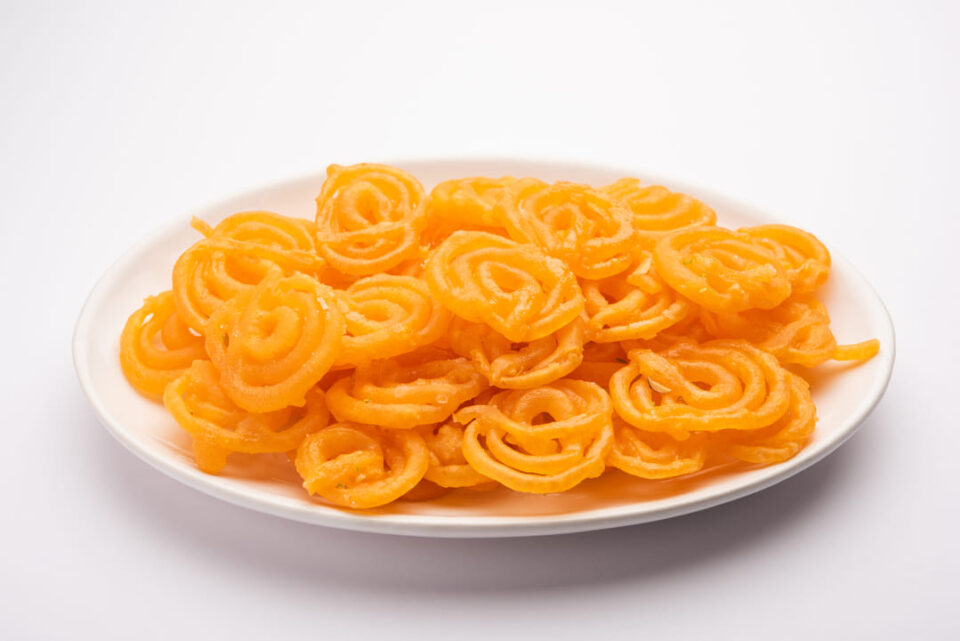I recently had the pleasure of conversing with Vivikt, a 19-year-old engineering student who introduced me to a unique ritual. Whenever he finds himself besieged by a migraine attack, Vivikt reaches for a plate of jalebi, accompanied by a steaming cup of milk. This tradition piqued my curiosity, and as a doctor, I couldn’t help but wonder: is eating jalebi truly beneficial during such health-related episodes?
The Enigma of Jalebi: Beyond the Aesthetics
Jalebi, with its captivating spirals and vibrant hues, is more than just a dessert; it is a cultural icon. This twisted delight possesses a distinct taste, a melodic crunch when bitten into, and concentric boundaries that beguile our senses. Moreover, jalebi’s complex structure is a testament to its fermentation process, rendering it a culinary marvel. But while it may seem quintessentially Indian, the origin of this sugary treat can be traced back to Persia.
Tracing Its Journey From Persia To India
Jalebi’s voyage across time and borders serves as a reminder that cuisine transcends geographical boundaries. Although it has become an integral part of Indian culture, jalebi was not born on Indian soil. Instead, it was a cherished confection that found its way into the subcontinent, representing the fusion of tastes and cultures. In today’s modern world, it is a sweet that is more often procured from sweet shops than lovingly crafted in the kitchens of homes.
The Occasional Indulgence: A Word of Caution
Before we delve into the health aspects of consuming jalebi, it’s important to recognize that this delectable treat is best enjoyed in moderation. Jalebi is a sugary delight, and as such, it’s not a recommended option for those with diabetes or individuals aiming to maintain a low-sugar diet.
The Migraine Remedy: Vivikt’s Unconventional Approach
Now, let’s circle back to Vivikt’s unconventional remedy for his migraine attacks. Many of us reach for painkillers or dark rooms when the throbbing pain sets in, but Vivikt swears by a combination of jalebi and hot milk. Could there be any scientific basis for this practice, or is it merely a unique quirk? To explore this, we need to understand the components at play.
The Science Behind Jalebi and Migraines
Migraines, characterized by severe headaches, often come with accompanying symptoms like nausea, light sensitivity, and sound sensitivity. While there’s no universal cure for migraines, some people find relief in hot beverages and certain foods. The potential benefit of hot milk might be attributed to its soothing qualities, as warmth can sometimes ease the tension associated with migraines.
The Role of Sugar: A Bittersweet Reality
However, when it comes to jalebi, it’s essential to recognize the dual nature of sugar. On one hand, the quick energy provided by sugar can temporarily alleviate symptoms of fatigue and headache. On the other, consuming too much sugar can lead to a rapid spike in blood glucose levels, followed by a crash, which may exacerbate migraine symptoms.
Balancing Act: Enjoying Jalebi Mindfully
So, what should one take away from Vivikt’s unique remedy? While jalebi might offer a temporary respite from migraines due to its sugar content, it’s essential to consume it mindfully. If you find comfort in the occasional indulgence of this beloved treat during a migraine episode, there’s no harm in trying it. However, it’s vital to remember that this is not a cure but rather a temporary relief measure.
Jalebi in Your Diet: A Word of Caution
As we consider the impact of jalebi on our health, it’s crucial to understand that this sugary delight should be an occasional treat rather than a dietary staple. Excessive sugar consumption has been linked to a range of health issues, including obesity, diabetes, and heart disease.
The Verdict: Jalebi in Moderation
The question remains: is eating jalebi good for your health? The answer is a nuanced one. Jalebi, with its irresistible charm, can be a delightful addition to your palate when enjoyed in moderation. However, it’s not a superfood or a magical remedy for health ailments. Vivikt’s unique tradition may offer some relief during migraine episodes, but it’s not a substitute for conventional medical treatment.
In our diverse culinary landscape, embracing the occasional indulgence in sweets like jalebi can be a celebration of culture and tradition. Just remember, whether it’s for migraines or simply to satisfy your sweet tooth, savor the sugary goodness of jalebi mindfully and in moderation.

